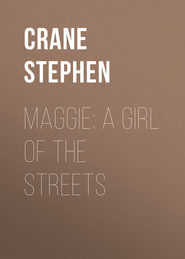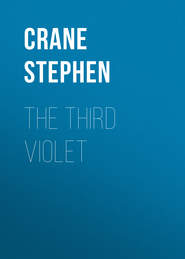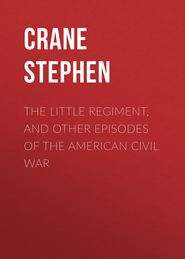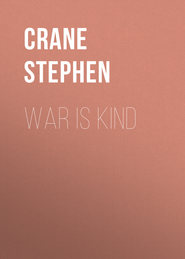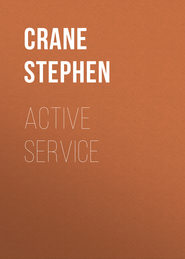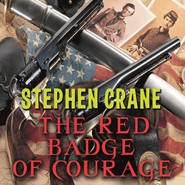По всем вопросам обращайтесь на: info@litportal.ru
(©) 2003-2025.
✖
The Red Badge of Courage: An Episode of the American Civil War
Настройки чтения
Размер шрифта
Высота строк
Поля
The swirling body of blue men came to a sudden halt at close and disastrous range and roared a swift volley. The group in gray was split and broken by this fire, but its riddled body still fought. The men in blue yelled again and rushed in upon it.
The youth, in his leapings, saw, as through a mist, a picture of four or five men stretched upon the ground or writhing upon their knees with bowed heads as if they had been stricken by bolts from the sky. Tottering among them was the rival color bearer, whom the youth saw had been bitten vitally by the bullets of the last formidable volley. He perceived this man fighting a last struggle, the struggle of one whose legs are grasped by demons. It was a ghastly battle. Over his face was the bleach of death, but set upon it was the dark and hard lines of desperate purpose. With this terrible grin of resolution he hugged his precious flag to him and was stumbling and staggering in his design to go the way that led to safety for it.
But his wounds always made it seem that his feet were retarded, held, and he fought a grim fight, as with invisible ghouls fastened greedily upon his limbs. Those in advance of the scampering blue men, howling cheers, leaped at the fence. The despair of the lost was in his eyes as he glanced back at them.
The youth's friend went over the obstruction in a tumbling heap and sprang at the flag as a panther at prey. He pulled at it and, wrenching it free, swung up its red brilliancy with a mad cry of exultation even as the color bearer, gasping, lurched over in a final throe and, stiffening convulsively, turned his dead face to the ground. There was much blood upon the grass blades.
At the place of success there began more wild clamorings of cheers. The men gesticulated and bellowed in an ecstasy. When they spoke it was as if they considered their listener to be a mile away. What hats and caps were left to them they often slung high in the air.
At one part of the line four men had been swooped upon, and they now sat as prisoners. Some blue men were about them in an eager and curious circle. The soldiers had trapped strange birds, and there was an examination. A flurry of fast questions was in the air.
One of the prisoners was nursing a superficial wound in the foot. He cuddled it, baby-wise, but he looked up from it often to curse with an astonishing utter abandon straight at the noses of his captors. He consigned them to red regions; he called upon the pestilential wrath of strange gods. And with it all he was singularly free from recognition of the finer points of the conduct of prisoners of war. It was as if a clumsy clod had trod upon his toe and he conceived it to be his privilege, his duty, to use deep, resentful oaths.
Another, who was a boy in years, took his plight with great calmness and apparent good nature. He conversed with the men in blue, studying their faces with his bright and keen eyes. They spoke of battles and conditions. There was an acute interest in all their faces during this exchange of view points. It seemed a great satisfaction to hear voices from where all had been darkness and speculation.
The third captive sat with a morose countenance. He preserved a stoical and cold attitude. To all advances he made one reply without variation, "Ah, go t' hell!"
The last of the four was always silent and, for the most part, kept his face turned in unmolested directions. From the views the youth received he seemed to be in a state of absolute dejection. Shame was upon him, and with it profound regret that he was, perhaps, no more to be counted in the ranks of his fellows. The youth could detect no expression that would allow him to believe that the other was giving a thought to his narrowed future, the pictured dungeons, perhaps, and starvations and brutalities, liable to the imagination. All to be seen was shame for captivity and regret for the right to antagonize.
After the men had celebrated sufficiently they settled down behind the old rail fence, on the opposite side to the one from which their foes had been driven. A few shot perfunctorily at distant marks.
There was some long grass. The youth nestled in it and rested, making a convenient rail support the flag. His friend, jubilant and glorified, holding his treasure with vanity, came to him there. They sat side by side and congratulated each other.
Chapter 24
The roarings that had stretched in a long line of sound across the face of the forest began to grow intermittent and weaker. The stentorian speeches of the artillery continued in some distant encounter, but the crashes of the musketry had almost ceased. The youth and his friend of a sudden looked up, feeling a deadened form of distress at the waning of these noises, which had become a part of life. They could see changes going on among the troops. There were marchings this way and that way. A battery wheeled leisurely. On the crest of a small hill was the thick gleam of many departing muskets.
The youth arose. "Well, what now, I wonder?" he said. By his tone he seemed to be preparing to resent some new monstrosity in the way of dins and smashes. He shaded his eyes with his grimy hand and gazed over the field.
His friend also arose and stared. "I bet we're goin' t' git along out of this an' back over th' river," said he.
"Well, I swan!" said the youth.
They waited, watching. Within a little while the regiment received orders to retrace its way. The men got up grunting from the grass, regretting the soft repose. They jerked their stiffened legs, and stretched their arms over their heads. One man swore as he rubbed his eyes. They all groaned "O Lord!" They had as many objections to this change as they would have had to a proposal for a new battle.
They trampled slowly back over the field across which they had run in a mad scamper.
The regiment marched until it had joined its fellows. The reformed brigade, in column, aimed through a wood at the road. Directly they were in a mass of dust-covered troops, and were trudging along in a way parallel to the enemy's lines as these had been defined by the previous turmoil.
They passed within view of a stolid white house, and saw in front of it groups of their comrades lying in wait behind a neat breastwork. A row of guns were booming at a distant enemy. Shells thrown in reply were raising clouds of dust and splinters. Horsemen dashed along the line of intrenchments.
At this point of its march the division curved away from the field and went winding off in the direction of the river. When the significance of this movement had impressed itself upon the youth he turned his head and looked over his shoulder toward the trampled and debris-strewed ground. He breathed a breath of new satisfaction. He finally nudged his friend. "Well, it's all over," he said to him.
His friend gazed backward. "B'Gawd, it is," he assented. They mused.
For a time the youth was obliged to reflect in a puzzled and uncertain way. His mind was undergoing a subtle change. It took moments for it to cast off its battleful ways and resume its accustomed course of thought. Gradually his brain emerged from the clogged clouds, and at last he was enabled to more closely comprehend himself and circumstance.
He understood then that the existence of shot and countershot was in the past. He had dwelt in a land of strange, squalling upheavals and had come forth. He had been where there was red of blood and black of passion, and he was escaped. His first thoughts were given to rejoicings at this fact.
Later he began to study his deeds, his failures, and his achievements. Thus, fresh from scenes where many of his usual machines of reflection had been idle, from where he had proceeded sheeplike, he struggled to marshal all his acts.
At last they marched before him clearly. From this present view point he was enabled to look upon them in spectator fashion and criticise them with some correctness, for his new condition had already defeated certain sympathies.
Regarding his procession of memory he felt gleeful and unregretting, for in it his public deeds were paraded in great and shining prominence. Those performances which had been witnessed by his fellows marched now in wide purple and gold, having various deflections. They went gayly with music. It was pleasure to watch these things. He spent delightful minutes viewing the gilded images of memory.
He saw that he was good. He recalled with a thrill of joy the respectful comments of his fellows upon his conduct.
Nevertheless, the ghost of his flight from the first engagement appeared to him and danced. There were small shoutings in his brain about these matters. For a moment he blushed, and the light of his soul flickered with shame.
A specter of reproach came to him. There loomed the dogging memory of the tattered soldier–he who, gored by bullets and faint of blood, had fretted concerning an imagined wound in another; he who had loaned his last of strength and intellect for the tall soldier; he who, blind with weariness and pain, had been deserted in the field.
For an instant a wretched chill of sweat was upon him at the thought that he might be detected in the thing. As he stood persistently before his vision, he gave vent to a cry of sharp irritation and agony.
His friend turned. "What's the matter, Henry?" he demanded. The youth's reply was an outburst of crimson oaths.
As he marched along the little branch-hung roadway among his prattling companions this vision of cruelty brooded over him. It clung near him always and darkened his view of these deeds in purple and gold. Whichever way his thoughts turned they were followed by the somber phantom of the desertion in the fields. He looked stealthily at his companions, feeling sure that they must discern in his face evidences of this pursuit. But they were plodding in ragged array, discussing with quick tongues the accomplishments of the late battle.
"Oh, if a man should come up an' ask me, I'd say we got a dum good lickin'."
"Lickin'–in yer eye! We ain't licked, sonny. We're goin' down here aways, swing aroun', an' come in behint 'em."
"Oh, hush, with your comin' in behint 'em. I've seen all 'a that I wanta. Don't tell me about comin' in behint–"
"Bill Smithers, he ses he'd rather been in ten hundred battles than been in that heluva hospital. He ses they got shootin' in th' nighttime, an' shells dropped plum among 'em in th' hospital. He ses sech hollerin' he never see."
"Hasbrouck? He's th' best off'cer in this here reg'ment. He's a whale."
"Didn't I tell yeh we'd come aroun' in behint 'em? Didn't I tell yeh so? We–"
"Oh, shet yeh mouth!"
For a time this pursuing recollection of the tattered man took all elation from the youth's veins. He saw his vivid error, and he was afraid that it would stand before him all his life. He took no share in the chatter of his comrades, nor did he look at them or know them, save when he felt sudden suspicion that they were seeing his thoughts and scrutinizing each detail of the scene with the tattered soldier.
Yet gradually he mustered force to put the sin at a distance. And at last his eyes seemed to open to some new ways. He found that he could look back upon the brass and bombast of his earlier gospels and see them truly. He was gleeful when he discovered that he now despised them.
With this conviction came a store of assurance. He felt a quiet manhood, nonassertive but of sturdy and strong blood. He knew that he would no more quail before his guides wherever they should point. He had been to touch the great death, and found that, after all, it was but the great death. He was a man.
So it came to pass that as he trudged from the place of blood and wrath his soul changed. He came from hot plowshares to prospects of clover tranquilly, and it was as if hot plowshares were not. Scars faded as flowers.
It rained. The procession of weary soldiers became a bedraggled train, despondent and muttering, marching with churning effort in a trough of liquid brown mud under a low, wretched sky. Yet the youth smiled, for he saw that the world was a world for him, though many discovered it to be made of oaths and walking sticks. He had rid himself of the red sickness of battle. The sultry nightmare was in the past. He had been an animal blistered and sweating in the heat and pain of war. He turned now with a lover's thirst to images of tranquil skies, fresh meadows, cool brooks–an existence of soft and eternal peace.
Over the river a golden ray of sun came through the hosts of leaden rain clouds.
THE END






